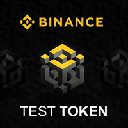-
 Bitcoin
Bitcoin $92,406.0232
-1.34% -
 Ethereum
Ethereum $1,768.4583
-1.36% -
 Tether USDt
Tether USDt $1.0000
-0.03% -
 XRP
XRP $2.1730
-2.52% -
 BNB
BNB $604.2475
-2.32% -
 Solana
Solana $148.1687
-2.25% -
 USDC
USDC $1.0000
0.01% -
 Dogecoin
Dogecoin $0.1734
-4.80% -
 Cardano
Cardano $0.6839
-1.46% -
 TRON
TRON $0.2437
-1.57% -
 Sui
Sui $3.0133
3.25% -
 Chainlink
Chainlink $14.4714
-0.68% -
 Avalanche
Avalanche $21.9915
-2.91% -
 UNUS SED LEO
UNUS SED LEO $9.2208
1.67% -
 Stellar
Stellar $0.2629
-1.62% -
 Toncoin
Toncoin $3.1121
-0.16% -
 Shiba Inu
Shiba Inu $0.0...01320
-3.97% -
 Hedera
Hedera $0.1787
-2.88% -
 Bitcoin Cash
Bitcoin Cash $357.7790
-1.03% -
 Polkadot
Polkadot $3.9943
-1.88% -
 Litecoin
Litecoin $82.4204
-2.04% -
 Hyperliquid
Hyperliquid $18.2204
-4.10% -
 Dai
Dai $1.0000
0.01% -
 Bitget Token
Bitget Token $4.4973
-3.79% -
 Ethena USDe
Ethena USDe $0.9994
-0.01% -
 Pi
Pi $0.6498
-0.73% -
 Monero
Monero $225.7950
-0.96% -
 Uniswap
Uniswap $5.8127
-2.40% -
 Pepe
Pepe $0.0...08574
-6.17% -
 Aptos
Aptos $5.2914
-0.19%
How will the government regulate Bitcoin payment platforms in the future? Trend prediction
Governments worldwide are regulating Bitcoin payment platforms with AML and KYC requirements, impacting user privacy and increasing compliance costs for businesses.
Apr 22, 2025 at 03:42 am
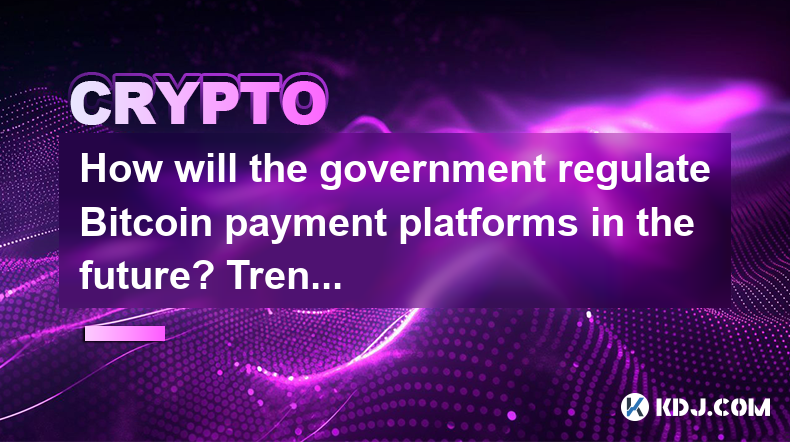
Introduction to Government Regulation of Bitcoin Payment Platforms
The regulation of Bitcoin payment platforms by governments is a topic of significant interest and concern within the cryptocurrency community. As Bitcoin and other cryptocurrencies gain popularity, governments worldwide are grappling with how to oversee these digital assets and the platforms that facilitate their use. This article explores the current trends in government regulation of Bitcoin payment platforms, providing insights into the approaches being taken and the potential implications for users and businesses.
Current Regulatory Landscape
Governments around the world have adopted various approaches to regulating Bitcoin payment platforms. In the United States, the Financial Crimes Enforcement Network (FinCEN) has classified Bitcoin exchanges and payment processors as Money Services Businesses (MSBs), subjecting them to anti-money laundering (AML) and know-your-customer (KYC) regulations. This means that Bitcoin payment platforms must implement robust systems to verify the identities of their users and report suspicious activities.
In the European Union, the Fifth Anti-Money Laundering Directive (5AMLD) extends AML and KYC requirements to cryptocurrency exchanges and wallet providers. This directive aims to prevent the use of cryptocurrencies for money laundering and terrorist financing, requiring platforms to adhere to strict compliance standards.
In Asia, countries like Japan have taken a proactive approach to regulating Bitcoin payment platforms. Japan's Payment Services Act requires cryptocurrency exchanges to register with the Financial Services Agency (FSA) and comply with stringent security and operational standards. This has led to a more regulated environment for Bitcoin transactions in Japan.
Trends in Regulatory Approaches
One of the key trends in the regulation of Bitcoin payment platforms is the increasing focus on consumer protection. Governments are recognizing the need to protect users from fraud, theft, and other risks associated with cryptocurrency transactions. This has led to the implementation of regulations that require platforms to maintain high levels of security and transparency.
Another trend is the harmonization of regulations across jurisdictions. As cryptocurrencies operate on a global scale, there is a growing need for consistent regulatory frameworks to prevent regulatory arbitrage and ensure a level playing field for businesses. International organizations like the Financial Action Task Force (FATF) are working to develop global standards for the regulation of virtual assets and their service providers.
The use of technology to enhance regulatory compliance is also a notable trend. Regulators are increasingly turning to technologies like blockchain analytics and artificial intelligence to monitor transactions and detect suspicious activities. This allows for more effective enforcement of AML and KYC regulations, reducing the risk of illicit activities on Bitcoin payment platforms.
Impact on Bitcoin Payment Platforms
The regulatory environment has significant implications for Bitcoin payment platforms. Compliance costs are a major concern for many platforms, as they must invest in systems and processes to meet regulatory requirements. This can be particularly challenging for smaller platforms with limited resources.
Operational changes are also common as platforms adapt to new regulations. For example, platforms may need to implement more stringent user verification processes, which can impact the user experience. Additionally, platforms may need to adjust their business models to comply with regulations, such as limiting the types of transactions they facilitate.
Market dynamics can also be affected by regulatory changes. In some cases, regulations may lead to a consolidation of the market, as smaller platforms struggle to comply and larger, more established platforms gain a competitive advantage. Conversely, clear and consistent regulations can foster a more stable and trustworthy environment, attracting more users and businesses to Bitcoin payment platforms.
Case Studies of Regulatory Actions
To illustrate the impact of government regulation on Bitcoin payment platforms, consider the following case studies:
BitLicense in New York: The New York State Department of Financial Services introduced the BitLicense in 2015, a regulatory framework specifically for virtual currency businesses. This has led to a significant reduction in the number of Bitcoin payment platforms operating in New York, as many found the compliance requirements too burdensome.
Binance's Regulatory Challenges: Binance, one of the world's largest cryptocurrency exchanges, has faced regulatory scrutiny in several countries. In 2021, Binance was forced to exit the Canadian market due to new regulations requiring registration with the Ontario Securities Commission. This highlights the challenges that global platforms face in navigating different regulatory environments.
South Korea's Real-Name System: South Korea implemented a real-name system for cryptocurrency transactions in 2021, requiring users to link their bank accounts to their cryptocurrency accounts. This has led to increased transparency and reduced anonymity on Bitcoin payment platforms in South Korea, aligning with the country's efforts to combat money laundering and fraud.
Strategies for Bitcoin Payment Platforms
Given the evolving regulatory landscape, Bitcoin payment platforms must adopt strategies to navigate these challenges effectively. Engaging with regulators is crucial, as platforms can provide valuable insights into the industry and help shape regulations that are both effective and practical. Platforms should also invest in compliance infrastructure, ensuring they have the systems and processes in place to meet regulatory requirements.
Educating users about the importance of compliance and the measures being taken to protect them is another important strategy. By fostering a culture of transparency and trust, platforms can build stronger relationships with their users and enhance their reputation in the market.
Diversifying operations can also help platforms mitigate regulatory risks. By operating in multiple jurisdictions and offering a range of services, platforms can reduce their dependence on any single market and adapt more easily to regulatory changes.
Frequently Asked Questions
Q: How do regulations affect the privacy of Bitcoin users?
A: Regulations such as AML and KYC requirements can impact the privacy of Bitcoin users by requiring platforms to collect and verify personal information. While these measures are intended to prevent illicit activities, they can reduce the anonymity that many users value in cryptocurrencies.
Q: Can Bitcoin payment platforms operate without any regulation?
A: It is highly unlikely for Bitcoin payment platforms to operate without any regulation, as governments are increasingly focused on overseeing the cryptocurrency industry to prevent fraud, money laundering, and other illegal activities. Platforms that attempt to operate without regulation may face legal consequences and lose the trust of users and investors.
Q: How do international regulations impact Bitcoin payment platforms?
A: International regulations can create challenges for Bitcoin payment platforms, as they must navigate different regulatory environments in each jurisdiction where they operate. This can lead to increased compliance costs and operational complexity. However, harmonization efforts by international organizations can help create a more consistent regulatory framework, making it easier for platforms to operate globally.
Q: What role do self-regulatory organizations play in the regulation of Bitcoin payment platforms?
A: Self-regulatory organizations (SROs) can play a significant role in the regulation of Bitcoin payment platforms by setting industry standards and best practices. SROs can help platforms comply with regulations more effectively and foster a culture of responsibility and transparency within the industry. However, SROs must work closely with government regulators to ensure their efforts align with broader regulatory goals.
Disclaimer:info@kdj.com
The information provided is not trading advice. kdj.com does not assume any responsibility for any investments made based on the information provided in this article. Cryptocurrencies are highly volatile and it is highly recommended that you invest with caution after thorough research!
If you believe that the content used on this website infringes your copyright, please contact us immediately (info@kdj.com) and we will delete it promptly.
- BNB Price Spikes 2.2% on a 98% Leap in Trading Volume as SEC Chairman Paul Atkins Drops a Bombshell
- 2025-04-24 15:15:12
- Remittix (RTX) ignites a PayFi revolution that threatens to topple Ripple (XRP) and create more crypto millionaires than Shiba Inu (SHIB).
- 2025-04-24 15:15:12
- XRP Price Surges 4.46% to $2.24 as Trading Volume Skyrockets 124% to $5.92 Billion
- 2025-04-24 15:10:11
- Major tokens fell as much as 5% on Thursday
- 2025-04-24 15:10:11
- XRP Price Prediction: Is This the Start of Altcoin Season?
- 2025-04-24 15:05:12
- XRP Finally Shows Signs of a Major Breakout
- 2025-04-24 15:05:12
Related knowledge

MANTRA will launch an OM token repurchase plan. How should investors respond?
Apr 22,2025 at 11:07am
MANTRA, a prominent player in the cryptocurrency space, has announced its plan to launch an OM token repurchase program. This development has sparked significant interest among investors, who are now faced with the decision of how to respond to this news. In this article, we will delve into the details of MANTRA's OM token repurchase plan and provide gu...
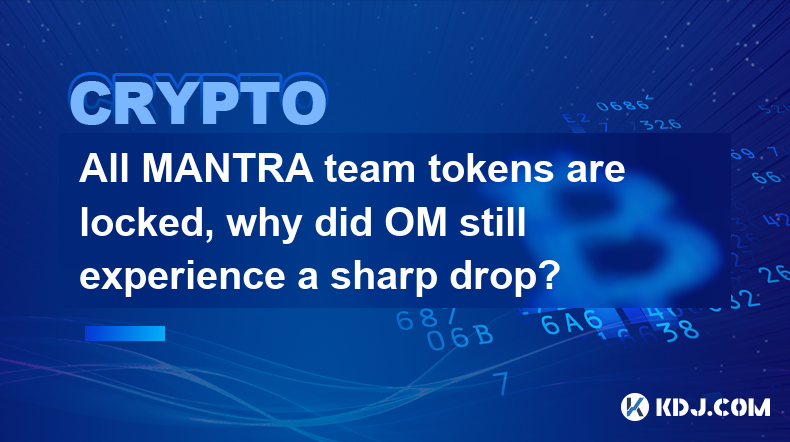
All MANTRA team tokens are locked, why did OM still experience a sharp drop?
Apr 20,2025 at 11:14am
Introduction to MANTRA and OM TokenThe MANTRA project is a blockchain platform that aims to provide a scalable and secure environment for decentralized applications (dApps). The native token of the MANTRA ecosystem is OM, which plays a crucial role in governance, staking, and other functionalities within the platform. Recently, the MANTRA team announced...

OM tokens were forced to close in the early morning. How can MANTRA avoid similar incidents?
Apr 22,2025 at 08:49pm
The recent forced closure of OM tokens in the early morning has raised concerns among cryptocurrency enthusiasts and investors about the stability and security of similar projects. MANTRA, another token in the cryptocurrency space, can learn valuable lessons from this incident to enhance its resilience and safeguard its community. In this article, we wi...
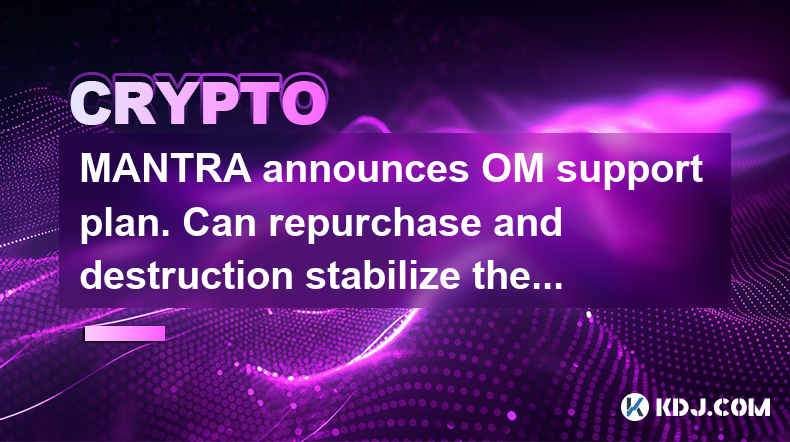
MANTRA announces OM support plan. Can repurchase and destruction stabilize the currency price?
Apr 21,2025 at 01:57pm
MANTRA, a notable player in the cryptocurrency ecosystem, has recently announced an OM support plan that includes mechanisms for repurchasing and destroying tokens. This move has sparked significant interest and discussion within the crypto community, particularly around its potential impact on the stability of the OM token's price. In this article, we ...

A large amount of OM was liquidated due to collateralization, causing a sharp drop? MANTRA analyzes the reasons for the market turmoil
Apr 21,2025 at 01:57am
The cryptocurrency market is known for its volatility, and sharp price movements can often be attributed to a variety of factors. Recently, a large amount of OM (Mantra DAO's native token) was liquidated due to collateralization issues, leading to significant market turmoil. In this article, MANTRA analyzes the reasons behind this event and the subseque...
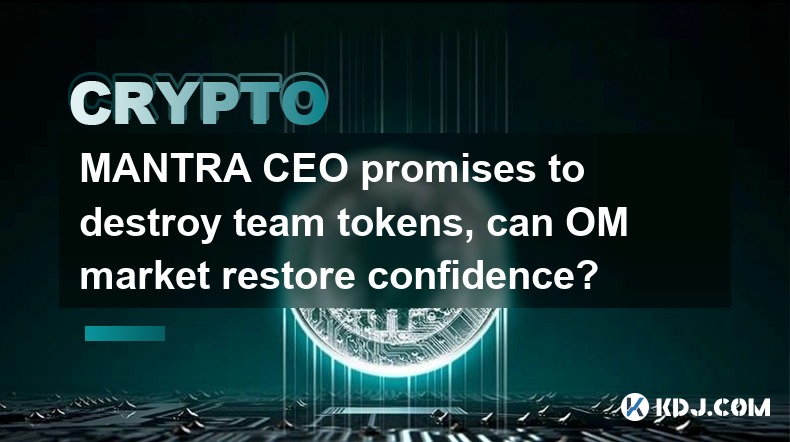
MANTRA CEO promises to destroy team tokens, can OM market restore confidence?
Apr 21,2025 at 08:28am
The recent announcement from the CEO of MANTRA about destroying team tokens has sparked a wave of discussions within the cryptocurrency community. This move is seen as a strategic effort to restore confidence in the OM market, which has been facing various challenges. The decision to burn team tokens is not just a simple action; it involves a series of ...

MANTRA will launch an OM token repurchase plan. How should investors respond?
Apr 22,2025 at 11:07am
MANTRA, a prominent player in the cryptocurrency space, has announced its plan to launch an OM token repurchase program. This development has sparked significant interest among investors, who are now faced with the decision of how to respond to this news. In this article, we will delve into the details of MANTRA's OM token repurchase plan and provide gu...

All MANTRA team tokens are locked, why did OM still experience a sharp drop?
Apr 20,2025 at 11:14am
Introduction to MANTRA and OM TokenThe MANTRA project is a blockchain platform that aims to provide a scalable and secure environment for decentralized applications (dApps). The native token of the MANTRA ecosystem is OM, which plays a crucial role in governance, staking, and other functionalities within the platform. Recently, the MANTRA team announced...

OM tokens were forced to close in the early morning. How can MANTRA avoid similar incidents?
Apr 22,2025 at 08:49pm
The recent forced closure of OM tokens in the early morning has raised concerns among cryptocurrency enthusiasts and investors about the stability and security of similar projects. MANTRA, another token in the cryptocurrency space, can learn valuable lessons from this incident to enhance its resilience and safeguard its community. In this article, we wi...

MANTRA announces OM support plan. Can repurchase and destruction stabilize the currency price?
Apr 21,2025 at 01:57pm
MANTRA, a notable player in the cryptocurrency ecosystem, has recently announced an OM support plan that includes mechanisms for repurchasing and destroying tokens. This move has sparked significant interest and discussion within the crypto community, particularly around its potential impact on the stability of the OM token's price. In this article, we ...

A large amount of OM was liquidated due to collateralization, causing a sharp drop? MANTRA analyzes the reasons for the market turmoil
Apr 21,2025 at 01:57am
The cryptocurrency market is known for its volatility, and sharp price movements can often be attributed to a variety of factors. Recently, a large amount of OM (Mantra DAO's native token) was liquidated due to collateralization issues, leading to significant market turmoil. In this article, MANTRA analyzes the reasons behind this event and the subseque...

MANTRA CEO promises to destroy team tokens, can OM market restore confidence?
Apr 21,2025 at 08:28am
The recent announcement from the CEO of MANTRA about destroying team tokens has sparked a wave of discussions within the cryptocurrency community. This move is seen as a strategic effort to restore confidence in the OM market, which has been facing various challenges. The decision to burn team tokens is not just a simple action; it involves a series of ...
See all articles




















































































